Business Law and Ethics: Employment, Constructive Dismissal, and Ethical Perspectives
VerifiedAdded on 2022/12/23
|8
|2488
|85
AI Summary
This report discusses the common rules in employment law, constructive dismissal, and various ethical perspectives in the context of business law and ethics. It explores the types of workers, important employment laws, and the concept of constructive dismissal. The report also delves into the ethical perspectives of utilitarianism and individualism in decision-making.
Contribute Materials
Your contribution can guide someone’s learning journey. Share your
documents today.
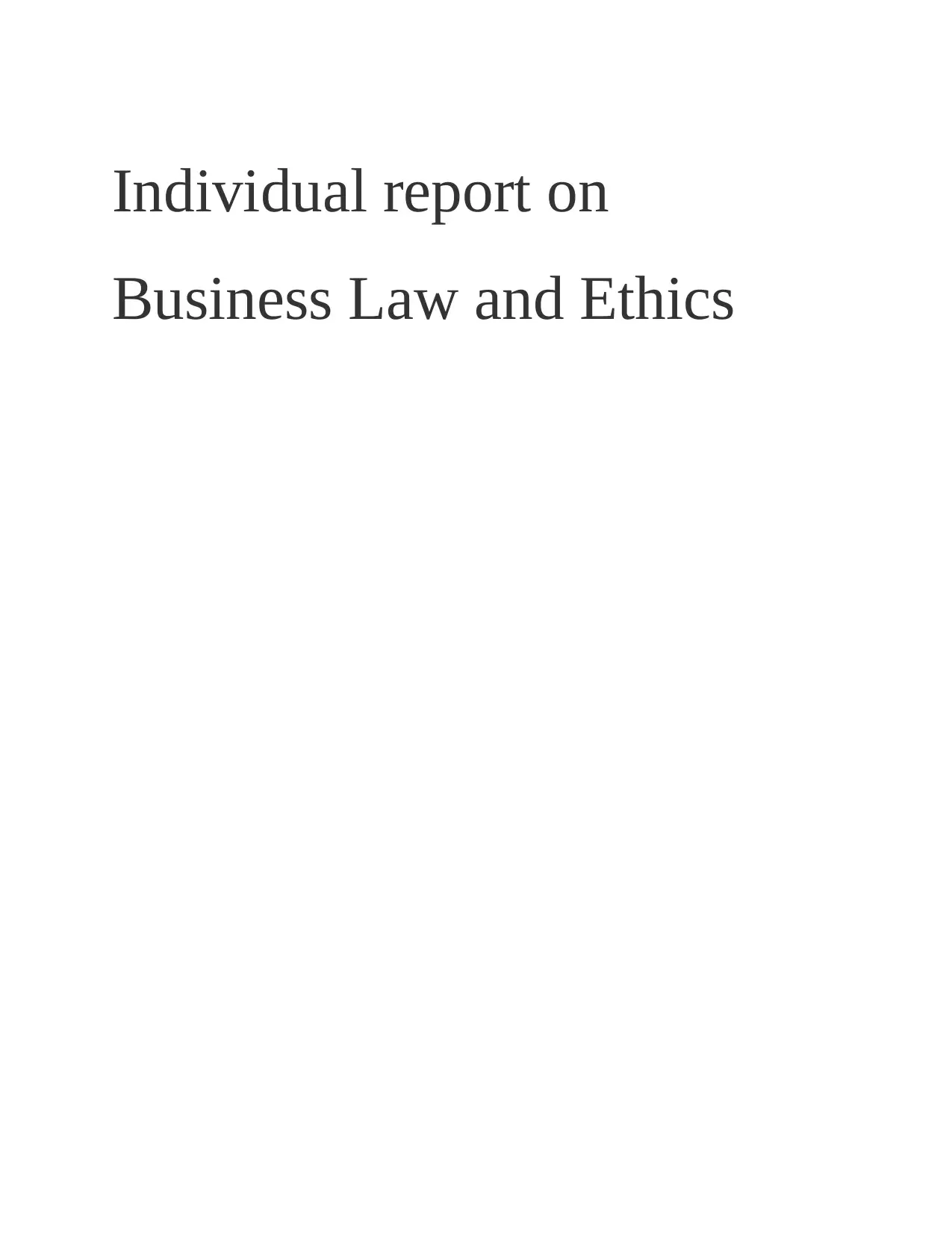
Individual report on
Business Law and Ethics
Business Law and Ethics
Secure Best Marks with AI Grader
Need help grading? Try our AI Grader for instant feedback on your assignments.
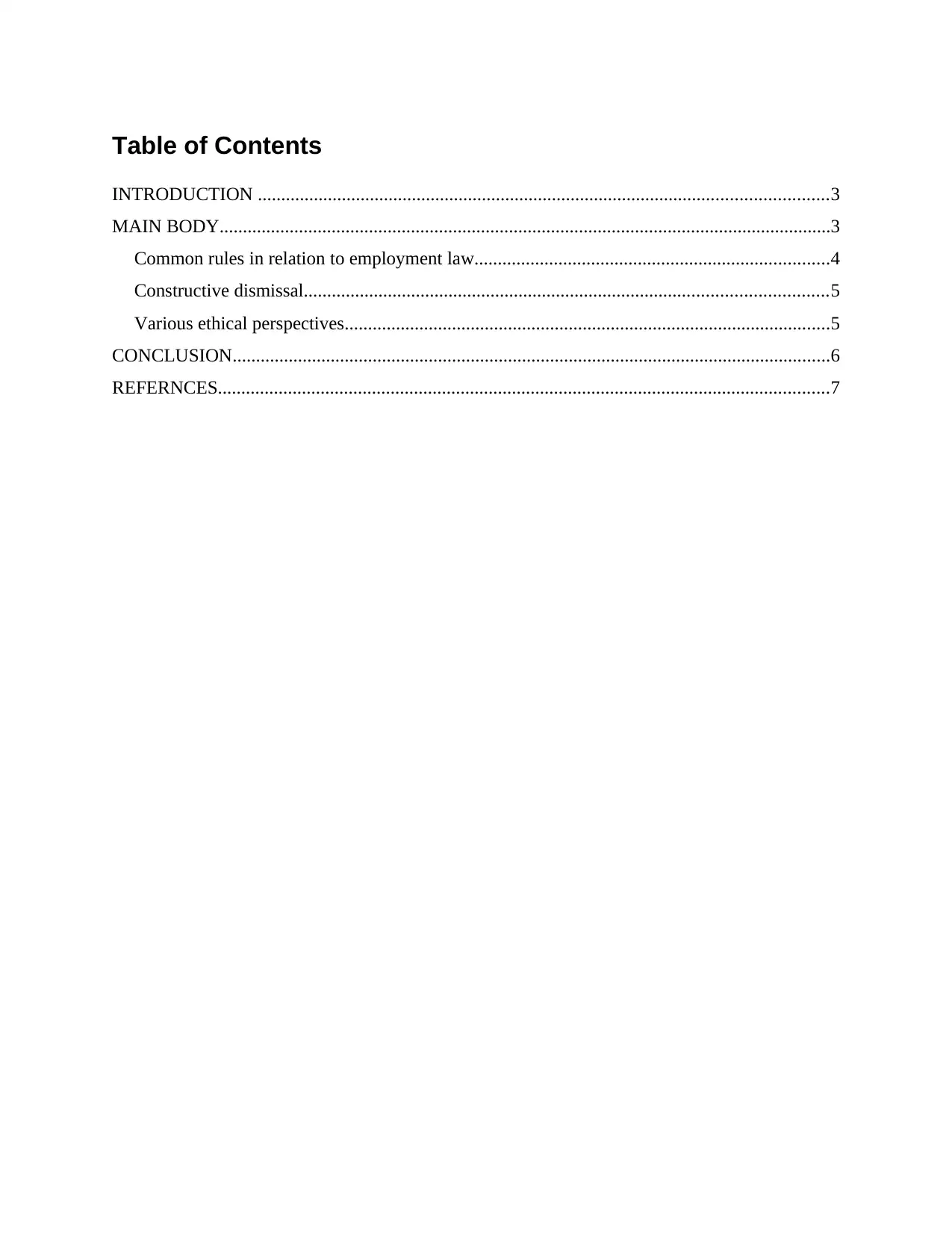
Table of Contents
INTRODUCTION ..........................................................................................................................3
MAIN BODY...................................................................................................................................3
Common rules in relation to employment law............................................................................4
Constructive dismissal................................................................................................................5
Various ethical perspectives........................................................................................................5
CONCLUSION................................................................................................................................6
REFERNCES...................................................................................................................................7
INTRODUCTION ..........................................................................................................................3
MAIN BODY...................................................................................................................................3
Common rules in relation to employment law............................................................................4
Constructive dismissal................................................................................................................5
Various ethical perspectives........................................................................................................5
CONCLUSION................................................................................................................................6
REFERNCES...................................................................................................................................7
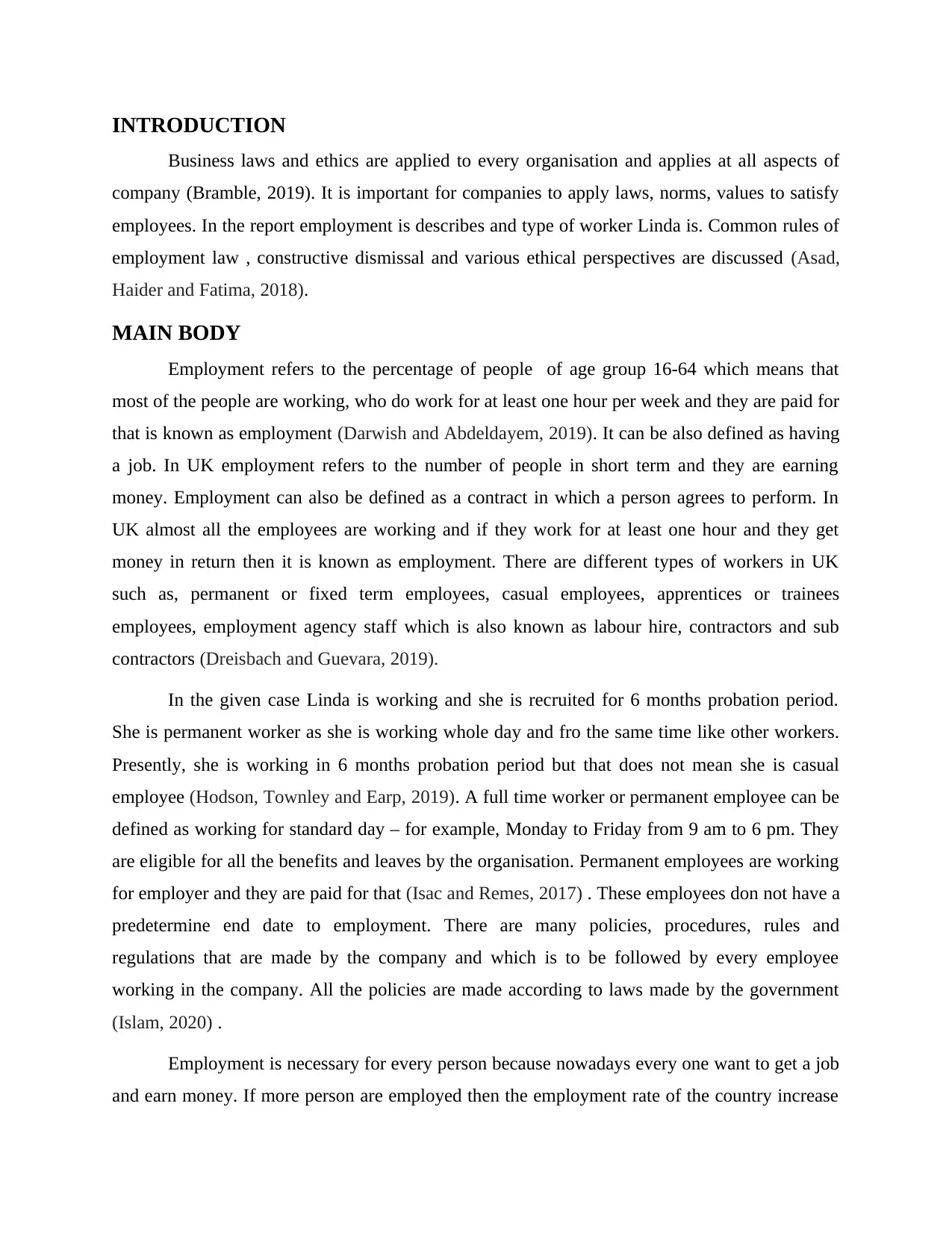
INTRODUCTION
Business laws and ethics are applied to every organisation and applies at all aspects of
company (Bramble, 2019). It is important for companies to apply laws, norms, values to satisfy
employees. In the report employment is describes and type of worker Linda is. Common rules of
employment law , constructive dismissal and various ethical perspectives are discussed (Asad,
Haider and Fatima, 2018).
MAIN BODY
Employment refers to the percentage of people of age group 16-64 which means that
most of the people are working, who do work for at least one hour per week and they are paid for
that is known as employment (Darwish and Abdeldayem, 2019). It can be also defined as having
a job. In UK employment refers to the number of people in short term and they are earning
money. Employment can also be defined as a contract in which a person agrees to perform. In
UK almost all the employees are working and if they work for at least one hour and they get
money in return then it is known as employment. There are different types of workers in UK
such as, permanent or fixed term employees, casual employees, apprentices or trainees
employees, employment agency staff which is also known as labour hire, contractors and sub
contractors (Dreisbach and Guevara, 2019).
In the given case Linda is working and she is recruited for 6 months probation period.
She is permanent worker as she is working whole day and fro the same time like other workers.
Presently, she is working in 6 months probation period but that does not mean she is casual
employee (Hodson, Townley and Earp, 2019). A full time worker or permanent employee can be
defined as working for standard day – for example, Monday to Friday from 9 am to 6 pm. They
are eligible for all the benefits and leaves by the organisation. Permanent employees are working
for employer and they are paid for that (Isac and Remes, 2017) . These employees don not have a
predetermine end date to employment. There are many policies, procedures, rules and
regulations that are made by the company and which is to be followed by every employee
working in the company. All the policies are made according to laws made by the government
(Islam, 2020) .
Employment is necessary for every person because nowadays every one want to get a job
and earn money. If more person are employed then the employment rate of the country increase
Business laws and ethics are applied to every organisation and applies at all aspects of
company (Bramble, 2019). It is important for companies to apply laws, norms, values to satisfy
employees. In the report employment is describes and type of worker Linda is. Common rules of
employment law , constructive dismissal and various ethical perspectives are discussed (Asad,
Haider and Fatima, 2018).
MAIN BODY
Employment refers to the percentage of people of age group 16-64 which means that
most of the people are working, who do work for at least one hour per week and they are paid for
that is known as employment (Darwish and Abdeldayem, 2019). It can be also defined as having
a job. In UK employment refers to the number of people in short term and they are earning
money. Employment can also be defined as a contract in which a person agrees to perform. In
UK almost all the employees are working and if they work for at least one hour and they get
money in return then it is known as employment. There are different types of workers in UK
such as, permanent or fixed term employees, casual employees, apprentices or trainees
employees, employment agency staff which is also known as labour hire, contractors and sub
contractors (Dreisbach and Guevara, 2019).
In the given case Linda is working and she is recruited for 6 months probation period.
She is permanent worker as she is working whole day and fro the same time like other workers.
Presently, she is working in 6 months probation period but that does not mean she is casual
employee (Hodson, Townley and Earp, 2019). A full time worker or permanent employee can be
defined as working for standard day – for example, Monday to Friday from 9 am to 6 pm. They
are eligible for all the benefits and leaves by the organisation. Permanent employees are working
for employer and they are paid for that (Isac and Remes, 2017) . These employees don not have a
predetermine end date to employment. There are many policies, procedures, rules and
regulations that are made by the company and which is to be followed by every employee
working in the company. All the policies are made according to laws made by the government
(Islam, 2020) .
Employment is necessary for every person because nowadays every one want to get a job
and earn money. If more person are employed then the employment rate of the country increase
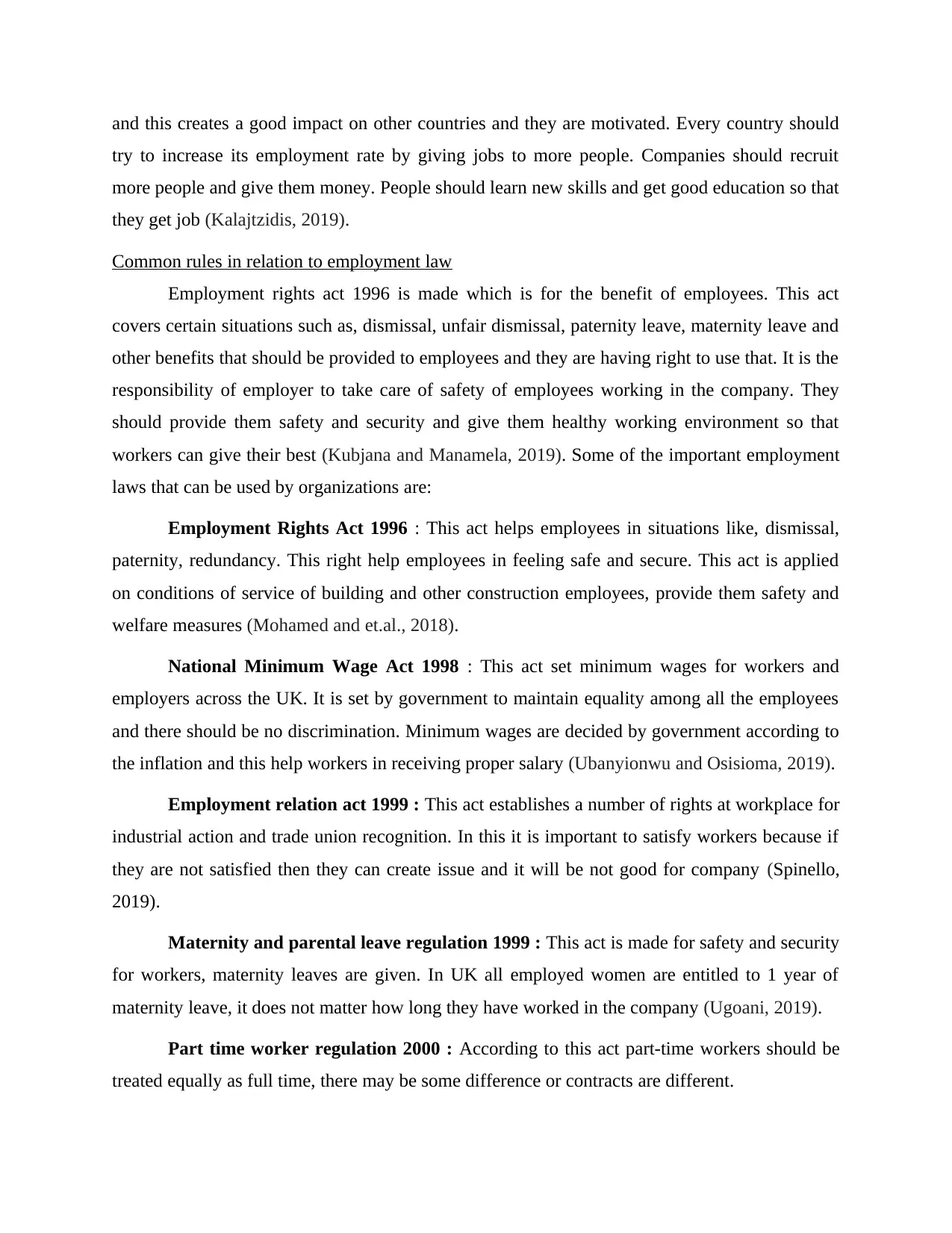
and this creates a good impact on other countries and they are motivated. Every country should
try to increase its employment rate by giving jobs to more people. Companies should recruit
more people and give them money. People should learn new skills and get good education so that
they get job (Kalajtzidis, 2019).
Common rules in relation to employment law
Employment rights act 1996 is made which is for the benefit of employees. This act
covers certain situations such as, dismissal, unfair dismissal, paternity leave, maternity leave and
other benefits that should be provided to employees and they are having right to use that. It is the
responsibility of employer to take care of safety of employees working in the company. They
should provide them safety and security and give them healthy working environment so that
workers can give their best (Kubjana and Manamela, 2019). Some of the important employment
laws that can be used by organizations are:
Employment Rights Act 1996 : This act helps employees in situations like, dismissal,
paternity, redundancy. This right help employees in feeling safe and secure. This act is applied
on conditions of service of building and other construction employees, provide them safety and
welfare measures (Mohamed and et.al., 2018).
National Minimum Wage Act 1998 : This act set minimum wages for workers and
employers across the UK. It is set by government to maintain equality among all the employees
and there should be no discrimination. Minimum wages are decided by government according to
the inflation and this help workers in receiving proper salary (Ubanyionwu and Osisioma, 2019).
Employment relation act 1999 : This act establishes a number of rights at workplace for
industrial action and trade union recognition. In this it is important to satisfy workers because if
they are not satisfied then they can create issue and it will be not good for company (Spinello,
2019).
Maternity and parental leave regulation 1999 : This act is made for safety and security
for workers, maternity leaves are given. In UK all employed women are entitled to 1 year of
maternity leave, it does not matter how long they have worked in the company (Ugoani, 2019).
Part time worker regulation 2000 : According to this act part-time workers should be
treated equally as full time, there may be some difference or contracts are different.
try to increase its employment rate by giving jobs to more people. Companies should recruit
more people and give them money. People should learn new skills and get good education so that
they get job (Kalajtzidis, 2019).
Common rules in relation to employment law
Employment rights act 1996 is made which is for the benefit of employees. This act
covers certain situations such as, dismissal, unfair dismissal, paternity leave, maternity leave and
other benefits that should be provided to employees and they are having right to use that. It is the
responsibility of employer to take care of safety of employees working in the company. They
should provide them safety and security and give them healthy working environment so that
workers can give their best (Kubjana and Manamela, 2019). Some of the important employment
laws that can be used by organizations are:
Employment Rights Act 1996 : This act helps employees in situations like, dismissal,
paternity, redundancy. This right help employees in feeling safe and secure. This act is applied
on conditions of service of building and other construction employees, provide them safety and
welfare measures (Mohamed and et.al., 2018).
National Minimum Wage Act 1998 : This act set minimum wages for workers and
employers across the UK. It is set by government to maintain equality among all the employees
and there should be no discrimination. Minimum wages are decided by government according to
the inflation and this help workers in receiving proper salary (Ubanyionwu and Osisioma, 2019).
Employment relation act 1999 : This act establishes a number of rights at workplace for
industrial action and trade union recognition. In this it is important to satisfy workers because if
they are not satisfied then they can create issue and it will be not good for company (Spinello,
2019).
Maternity and parental leave regulation 1999 : This act is made for safety and security
for workers, maternity leaves are given. In UK all employed women are entitled to 1 year of
maternity leave, it does not matter how long they have worked in the company (Ugoani, 2019).
Part time worker regulation 2000 : According to this act part-time workers should be
treated equally as full time, there may be some difference or contracts are different.
Secure Best Marks with AI Grader
Need help grading? Try our AI Grader for instant feedback on your assignments.
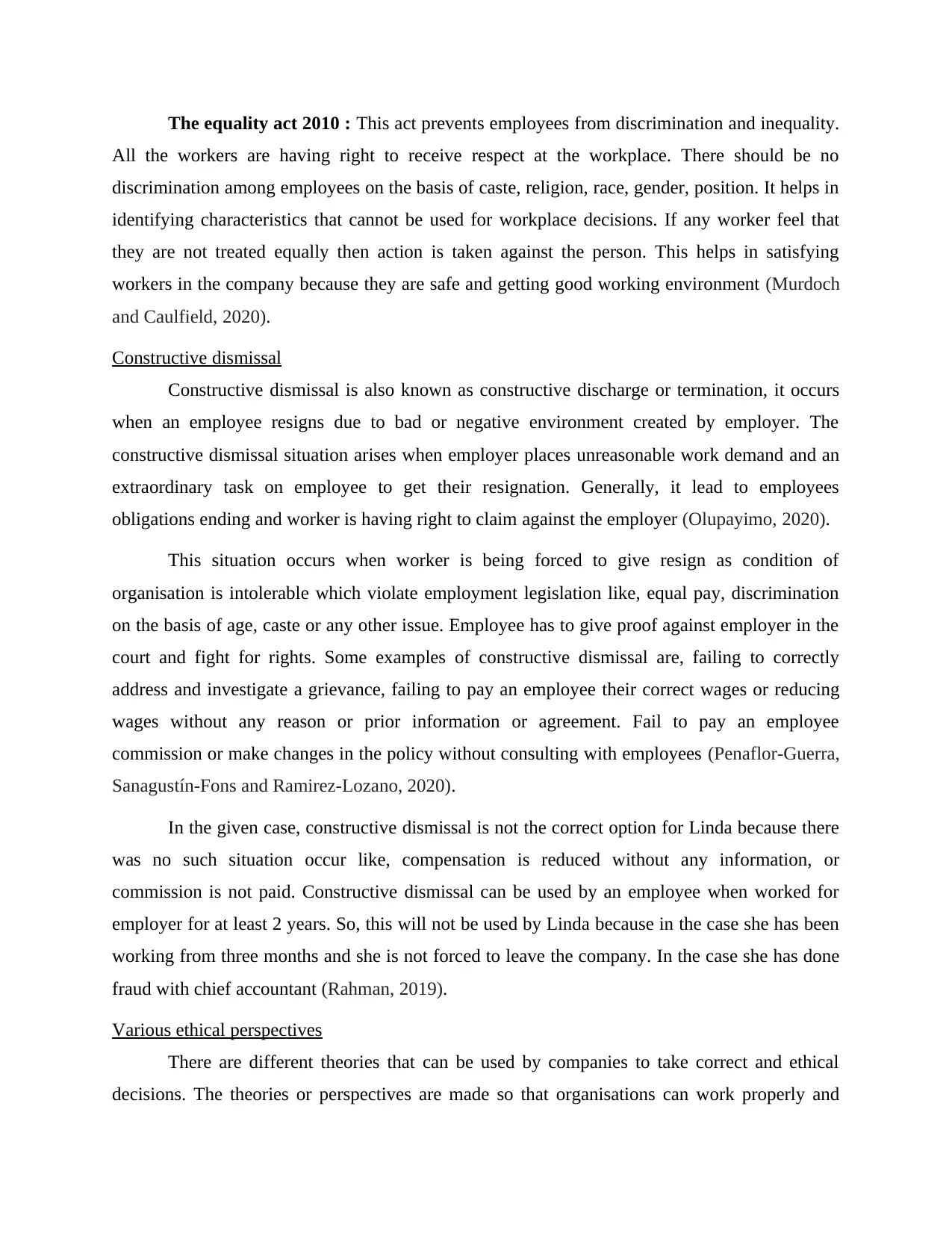
The equality act 2010 : This act prevents employees from discrimination and inequality.
All the workers are having right to receive respect at the workplace. There should be no
discrimination among employees on the basis of caste, religion, race, gender, position. It helps in
identifying characteristics that cannot be used for workplace decisions. If any worker feel that
they are not treated equally then action is taken against the person. This helps in satisfying
workers in the company because they are safe and getting good working environment (Murdoch
and Caulfield, 2020).
Constructive dismissal
Constructive dismissal is also known as constructive discharge or termination, it occurs
when an employee resigns due to bad or negative environment created by employer. The
constructive dismissal situation arises when employer places unreasonable work demand and an
extraordinary task on employee to get their resignation. Generally, it lead to employees
obligations ending and worker is having right to claim against the employer (Olupayimo, 2020).
This situation occurs when worker is being forced to give resign as condition of
organisation is intolerable which violate employment legislation like, equal pay, discrimination
on the basis of age, caste or any other issue. Employee has to give proof against employer in the
court and fight for rights. Some examples of constructive dismissal are, failing to correctly
address and investigate a grievance, failing to pay an employee their correct wages or reducing
wages without any reason or prior information or agreement. Fail to pay an employee
commission or make changes in the policy without consulting with employees (Penaflor-Guerra,
Sanagustín-Fons and Ramirez-Lozano, 2020).
In the given case, constructive dismissal is not the correct option for Linda because there
was no such situation occur like, compensation is reduced without any information, or
commission is not paid. Constructive dismissal can be used by an employee when worked for
employer for at least 2 years. So, this will not be used by Linda because in the case she has been
working from three months and she is not forced to leave the company. In the case she has done
fraud with chief accountant (Rahman, 2019).
Various ethical perspectives
There are different theories that can be used by companies to take correct and ethical
decisions. The theories or perspectives are made so that organisations can work properly and
All the workers are having right to receive respect at the workplace. There should be no
discrimination among employees on the basis of caste, religion, race, gender, position. It helps in
identifying characteristics that cannot be used for workplace decisions. If any worker feel that
they are not treated equally then action is taken against the person. This helps in satisfying
workers in the company because they are safe and getting good working environment (Murdoch
and Caulfield, 2020).
Constructive dismissal
Constructive dismissal is also known as constructive discharge or termination, it occurs
when an employee resigns due to bad or negative environment created by employer. The
constructive dismissal situation arises when employer places unreasonable work demand and an
extraordinary task on employee to get their resignation. Generally, it lead to employees
obligations ending and worker is having right to claim against the employer (Olupayimo, 2020).
This situation occurs when worker is being forced to give resign as condition of
organisation is intolerable which violate employment legislation like, equal pay, discrimination
on the basis of age, caste or any other issue. Employee has to give proof against employer in the
court and fight for rights. Some examples of constructive dismissal are, failing to correctly
address and investigate a grievance, failing to pay an employee their correct wages or reducing
wages without any reason or prior information or agreement. Fail to pay an employee
commission or make changes in the policy without consulting with employees (Penaflor-Guerra,
Sanagustín-Fons and Ramirez-Lozano, 2020).
In the given case, constructive dismissal is not the correct option for Linda because there
was no such situation occur like, compensation is reduced without any information, or
commission is not paid. Constructive dismissal can be used by an employee when worked for
employer for at least 2 years. So, this will not be used by Linda because in the case she has been
working from three months and she is not forced to leave the company. In the case she has done
fraud with chief accountant (Rahman, 2019).
Various ethical perspectives
There are different theories that can be used by companies to take correct and ethical
decisions. The theories or perspectives are made so that organisations can work properly and
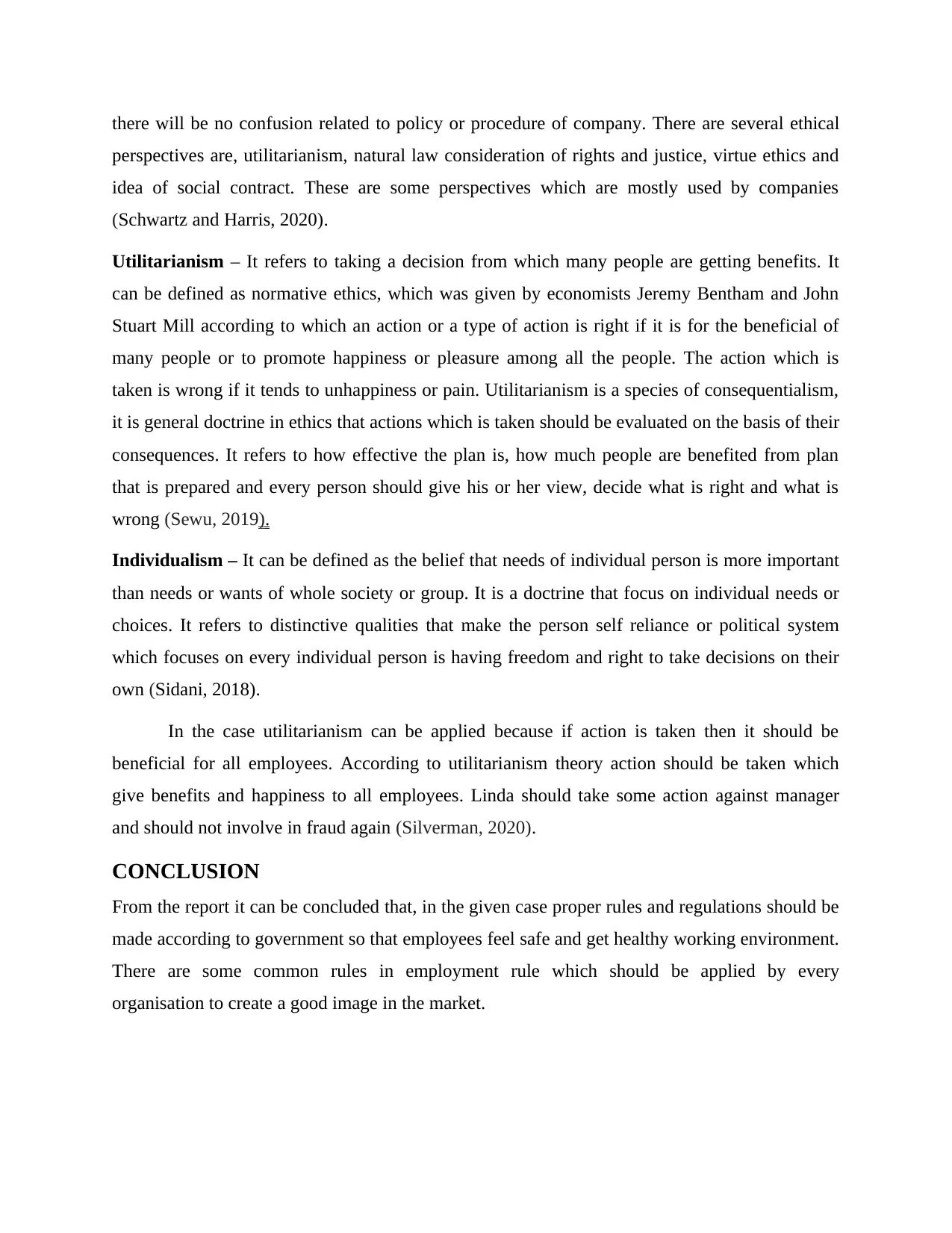
there will be no confusion related to policy or procedure of company. There are several ethical
perspectives are, utilitarianism, natural law consideration of rights and justice, virtue ethics and
idea of social contract. These are some perspectives which are mostly used by companies
(Schwartz and Harris, 2020).
Utilitarianism – It refers to taking a decision from which many people are getting benefits. It
can be defined as normative ethics, which was given by economists Jeremy Bentham and John
Stuart Mill according to which an action or a type of action is right if it is for the beneficial of
many people or to promote happiness or pleasure among all the people. The action which is
taken is wrong if it tends to unhappiness or pain. Utilitarianism is a species of consequentialism,
it is general doctrine in ethics that actions which is taken should be evaluated on the basis of their
consequences. It refers to how effective the plan is, how much people are benefited from plan
that is prepared and every person should give his or her view, decide what is right and what is
wrong (Sewu, 2019).
Individualism – It can be defined as the belief that needs of individual person is more important
than needs or wants of whole society or group. It is a doctrine that focus on individual needs or
choices. It refers to distinctive qualities that make the person self reliance or political system
which focuses on every individual person is having freedom and right to take decisions on their
own (Sidani, 2018).
In the case utilitarianism can be applied because if action is taken then it should be
beneficial for all employees. According to utilitarianism theory action should be taken which
give benefits and happiness to all employees. Linda should take some action against manager
and should not involve in fraud again (Silverman, 2020).
CONCLUSION
From the report it can be concluded that, in the given case proper rules and regulations should be
made according to government so that employees feel safe and get healthy working environment.
There are some common rules in employment rule which should be applied by every
organisation to create a good image in the market.
perspectives are, utilitarianism, natural law consideration of rights and justice, virtue ethics and
idea of social contract. These are some perspectives which are mostly used by companies
(Schwartz and Harris, 2020).
Utilitarianism – It refers to taking a decision from which many people are getting benefits. It
can be defined as normative ethics, which was given by economists Jeremy Bentham and John
Stuart Mill according to which an action or a type of action is right if it is for the beneficial of
many people or to promote happiness or pleasure among all the people. The action which is
taken is wrong if it tends to unhappiness or pain. Utilitarianism is a species of consequentialism,
it is general doctrine in ethics that actions which is taken should be evaluated on the basis of their
consequences. It refers to how effective the plan is, how much people are benefited from plan
that is prepared and every person should give his or her view, decide what is right and what is
wrong (Sewu, 2019).
Individualism – It can be defined as the belief that needs of individual person is more important
than needs or wants of whole society or group. It is a doctrine that focus on individual needs or
choices. It refers to distinctive qualities that make the person self reliance or political system
which focuses on every individual person is having freedom and right to take decisions on their
own (Sidani, 2018).
In the case utilitarianism can be applied because if action is taken then it should be
beneficial for all employees. According to utilitarianism theory action should be taken which
give benefits and happiness to all employees. Linda should take some action against manager
and should not involve in fraud again (Silverman, 2020).
CONCLUSION
From the report it can be concluded that, in the given case proper rules and regulations should be
made according to government so that employees feel safe and get healthy working environment.
There are some common rules in employment rule which should be applied by every
organisation to create a good image in the market.
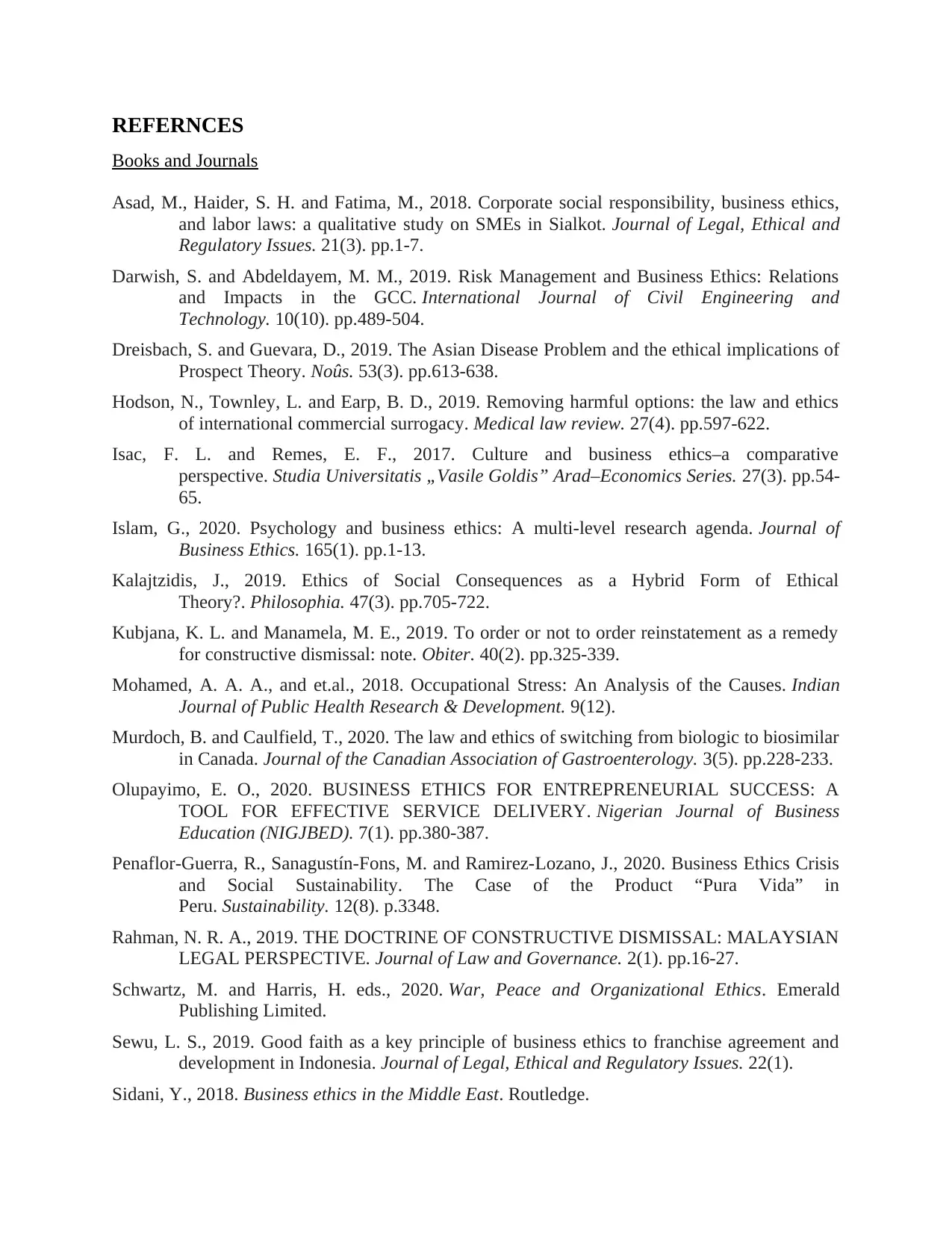
REFERNCES
Books and Journals
Asad, M., Haider, S. H. and Fatima, M., 2018. Corporate social responsibility, business ethics,
and labor laws: a qualitative study on SMEs in Sialkot. Journal of Legal, Ethical and
Regulatory Issues. 21(3). pp.1-7.
Darwish, S. and Abdeldayem, M. M., 2019. Risk Management and Business Ethics: Relations
and Impacts in the GCC. International Journal of Civil Engineering and
Technology. 10(10). pp.489-504.
Dreisbach, S. and Guevara, D., 2019. The Asian Disease Problem and the ethical implications of
Prospect Theory. Noûs. 53(3). pp.613-638.
Hodson, N., Townley, L. and Earp, B. D., 2019. Removing harmful options: the law and ethics
of international commercial surrogacy. Medical law review. 27(4). pp.597-622.
Isac, F. L. and Remes, E. F., 2017. Culture and business ethics–a comparative
perspective. Studia Universitatis „Vasile Goldis” Arad–Economics Series. 27(3). pp.54-
65.
Islam, G., 2020. Psychology and business ethics: A multi-level research agenda. Journal of
Business Ethics. 165(1). pp.1-13.
Kalajtzidis, J., 2019. Ethics of Social Consequences as a Hybrid Form of Ethical
Theory?. Philosophia. 47(3). pp.705-722.
Kubjana, K. L. and Manamela, M. E., 2019. To order or not to order reinstatement as a remedy
for constructive dismissal: note. Obiter. 40(2). pp.325-339.
Mohamed, A. A. A., and et.al., 2018. Occupational Stress: An Analysis of the Causes. Indian
Journal of Public Health Research & Development. 9(12).
Murdoch, B. and Caulfield, T., 2020. The law and ethics of switching from biologic to biosimilar
in Canada. Journal of the Canadian Association of Gastroenterology. 3(5). pp.228-233.
Olupayimo, E. O., 2020. BUSINESS ETHICS FOR ENTREPRENEURIAL SUCCESS: A
TOOL FOR EFFECTIVE SERVICE DELIVERY. Nigerian Journal of Business
Education (NIGJBED). 7(1). pp.380-387.
Penaflor-Guerra, R., Sanagustín-Fons, M. and Ramirez-Lozano, J., 2020. Business Ethics Crisis
and Social Sustainability. The Case of the Product “Pura Vida” in
Peru. Sustainability. 12(8). p.3348.
Rahman, N. R. A., 2019. THE DOCTRINE OF CONSTRUCTIVE DISMISSAL: MALAYSIAN
LEGAL PERSPECTIVE. Journal of Law and Governance. 2(1). pp.16-27.
Schwartz, M. and Harris, H. eds., 2020. War, Peace and Organizational Ethics. Emerald
Publishing Limited.
Sewu, L. S., 2019. Good faith as a key principle of business ethics to franchise agreement and
development in Indonesia. Journal of Legal, Ethical and Regulatory Issues. 22(1).
Sidani, Y., 2018. Business ethics in the Middle East. Routledge.
Books and Journals
Asad, M., Haider, S. H. and Fatima, M., 2018. Corporate social responsibility, business ethics,
and labor laws: a qualitative study on SMEs in Sialkot. Journal of Legal, Ethical and
Regulatory Issues. 21(3). pp.1-7.
Darwish, S. and Abdeldayem, M. M., 2019. Risk Management and Business Ethics: Relations
and Impacts in the GCC. International Journal of Civil Engineering and
Technology. 10(10). pp.489-504.
Dreisbach, S. and Guevara, D., 2019. The Asian Disease Problem and the ethical implications of
Prospect Theory. Noûs. 53(3). pp.613-638.
Hodson, N., Townley, L. and Earp, B. D., 2019. Removing harmful options: the law and ethics
of international commercial surrogacy. Medical law review. 27(4). pp.597-622.
Isac, F. L. and Remes, E. F., 2017. Culture and business ethics–a comparative
perspective. Studia Universitatis „Vasile Goldis” Arad–Economics Series. 27(3). pp.54-
65.
Islam, G., 2020. Psychology and business ethics: A multi-level research agenda. Journal of
Business Ethics. 165(1). pp.1-13.
Kalajtzidis, J., 2019. Ethics of Social Consequences as a Hybrid Form of Ethical
Theory?. Philosophia. 47(3). pp.705-722.
Kubjana, K. L. and Manamela, M. E., 2019. To order or not to order reinstatement as a remedy
for constructive dismissal: note. Obiter. 40(2). pp.325-339.
Mohamed, A. A. A., and et.al., 2018. Occupational Stress: An Analysis of the Causes. Indian
Journal of Public Health Research & Development. 9(12).
Murdoch, B. and Caulfield, T., 2020. The law and ethics of switching from biologic to biosimilar
in Canada. Journal of the Canadian Association of Gastroenterology. 3(5). pp.228-233.
Olupayimo, E. O., 2020. BUSINESS ETHICS FOR ENTREPRENEURIAL SUCCESS: A
TOOL FOR EFFECTIVE SERVICE DELIVERY. Nigerian Journal of Business
Education (NIGJBED). 7(1). pp.380-387.
Penaflor-Guerra, R., Sanagustín-Fons, M. and Ramirez-Lozano, J., 2020. Business Ethics Crisis
and Social Sustainability. The Case of the Product “Pura Vida” in
Peru. Sustainability. 12(8). p.3348.
Rahman, N. R. A., 2019. THE DOCTRINE OF CONSTRUCTIVE DISMISSAL: MALAYSIAN
LEGAL PERSPECTIVE. Journal of Law and Governance. 2(1). pp.16-27.
Schwartz, M. and Harris, H. eds., 2020. War, Peace and Organizational Ethics. Emerald
Publishing Limited.
Sewu, L. S., 2019. Good faith as a key principle of business ethics to franchise agreement and
development in Indonesia. Journal of Legal, Ethical and Regulatory Issues. 22(1).
Sidani, Y., 2018. Business ethics in the Middle East. Routledge.
Paraphrase This Document
Need a fresh take? Get an instant paraphrase of this document with our AI Paraphraser
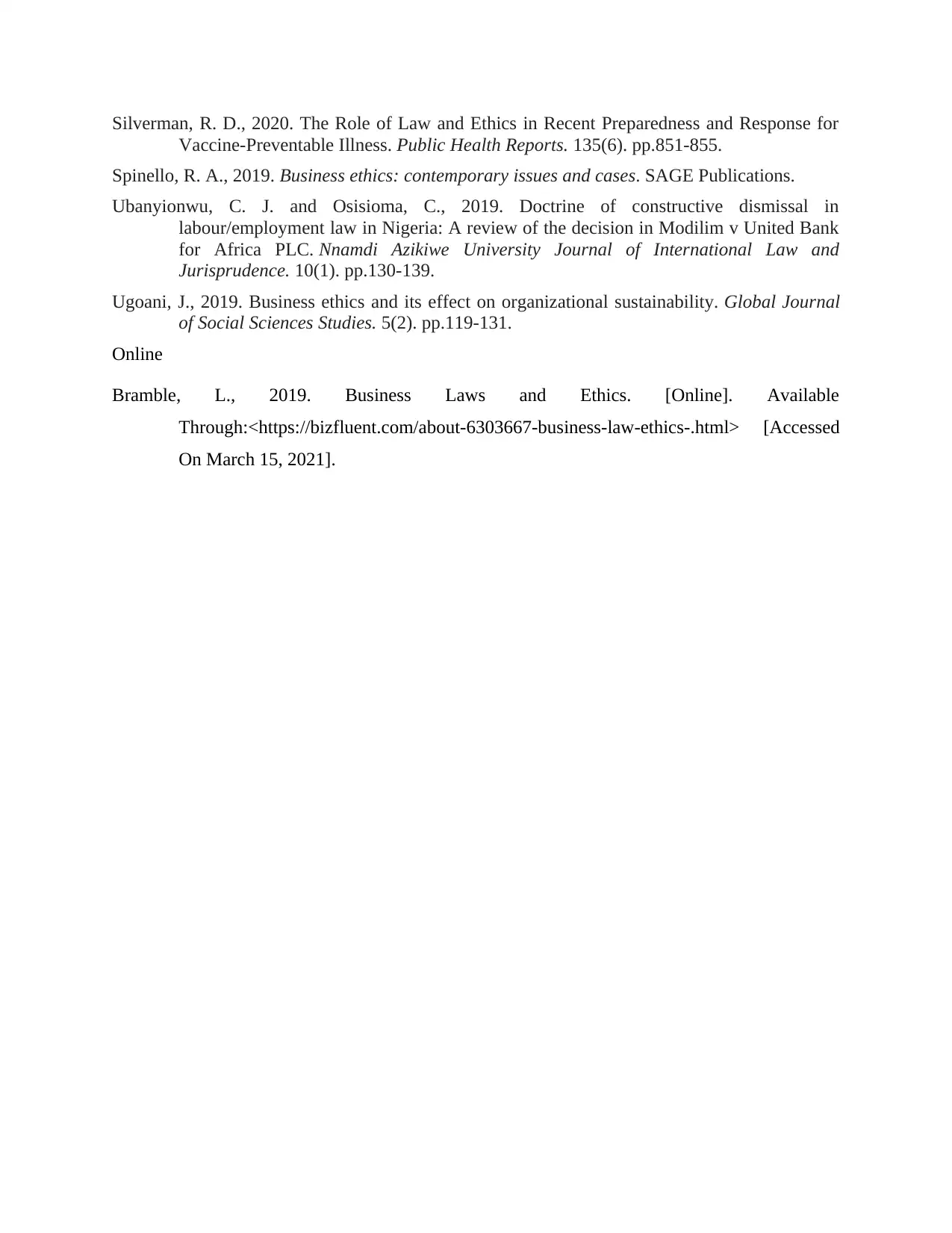
Silverman, R. D., 2020. The Role of Law and Ethics in Recent Preparedness and Response for
Vaccine-Preventable Illness. Public Health Reports. 135(6). pp.851-855.
Spinello, R. A., 2019. Business ethics: contemporary issues and cases. SAGE Publications.
Ubanyionwu, C. J. and Osisioma, C., 2019. Doctrine of constructive dismissal in
labour/employment law in Nigeria: A review of the decision in Modilim v United Bank
for Africa PLC. Nnamdi Azikiwe University Journal of International Law and
Jurisprudence. 10(1). pp.130-139.
Ugoani, J., 2019. Business ethics and its effect on organizational sustainability. Global Journal
of Social Sciences Studies. 5(2). pp.119-131.
Online
Bramble, L., 2019. Business Laws and Ethics. [Online]. Available
Through:<https://bizfluent.com/about-6303667-business-law-ethics-.html> [Accessed
On March 15, 2021].
Vaccine-Preventable Illness. Public Health Reports. 135(6). pp.851-855.
Spinello, R. A., 2019. Business ethics: contemporary issues and cases. SAGE Publications.
Ubanyionwu, C. J. and Osisioma, C., 2019. Doctrine of constructive dismissal in
labour/employment law in Nigeria: A review of the decision in Modilim v United Bank
for Africa PLC. Nnamdi Azikiwe University Journal of International Law and
Jurisprudence. 10(1). pp.130-139.
Ugoani, J., 2019. Business ethics and its effect on organizational sustainability. Global Journal
of Social Sciences Studies. 5(2). pp.119-131.
Online
Bramble, L., 2019. Business Laws and Ethics. [Online]. Available
Through:<https://bizfluent.com/about-6303667-business-law-ethics-.html> [Accessed
On March 15, 2021].
1 out of 8
Related Documents
Your All-in-One AI-Powered Toolkit for Academic Success.
+13062052269
info@desklib.com
Available 24*7 on WhatsApp / Email
![[object Object]](/_next/static/media/star-bottom.7253800d.svg)
Unlock your academic potential
© 2024 | Zucol Services PVT LTD | All rights reserved.





